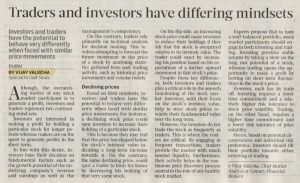Sunday, December 10, 2017
Gulf News – Investing vs Trading
تم إعداد هذا المنشور من قبل فيجاي فاليتشا

Investors and traders have the potential to behave very differently when faced with similar price movements
Although, the overarching motive of any stock market participant is to generate a profit, investors and traders represent two contrasting mind sets.
Investors are interested in making a profit by holding a particular stock for longer periods whereas traders are on the quest to generate profits in the short-term.
In line with this desire, investors base their decision on fundamental factors such as the growth potential of the underlying company’s revenue and earnings as well as the management’s competency.
On the contrary, traders rely primarily on technical analysis for decision making. This involves attempting to forecast the future movement in the price of a stock by analysing statistics gathered from past trading activity, such as historical price movements and volume trends.
Declining prices
Based on their mindsets, investors and traders have the potential to behave very differently when faced with similar price movements. For instance, a declining stock price could spur investors to increase their holding of a particular stock.
This is because they may feel that the price has slipped below the stock’s intrinsic value indicating a long-term increase towards it. On the contrary, the same declining price, could spur a trader to limit his losses by decreasing his holding of that very same stock.
On the flip side, an increasing stock price could cause investors to reduce their holdings if they felt that the stock is overpriced relative to its intrinsic value. The trader could react by increasing his position based on his expectations of a further upward movement in that stock’s price.
Despite these key differences, both investors and traders play a critical role in the smooth functioning of the stock market. Investors, with their focus on the stock’s intrinsic value, help to steer stock prices towards their fundamental value over the long term.
However, the investors do not trade the stock as frequently as traders. This is where the traders are critical. By engaging in frequent transactions, traders provide the market with much needed liquidity. Furthermore, their activity helps in the continuous price discovery process central to the role of any healthy stock market.
Experts propose that to have a well-balanced portfolio, stock market participants should engage in both investing and trading. Investing provides stable returns by taking a view on the long run potential of a stock, whereas trading opens the opportunity to make a profit by betting on short-term fluctuations in the stock’s price.
However, each has its trade off. Investing requires a lower time commitment and a relatively higher risk tolerance to stock price volatility. Trading, on the other hand, requires a higher time commitment and a lower risk tolerance of price volatility.
Hence, based on personal circumstances and individual risk preference, investors should tilt their portfolio towards either investing or trading.
– Vijay Valecha, Chief Market Analyst at Century Financial Brokers
Source:
__511674160.jpg)
__1302024813.jpg)
__1878767494.jpg)
__1738963817.jpg)
__1225849453.jpg)











